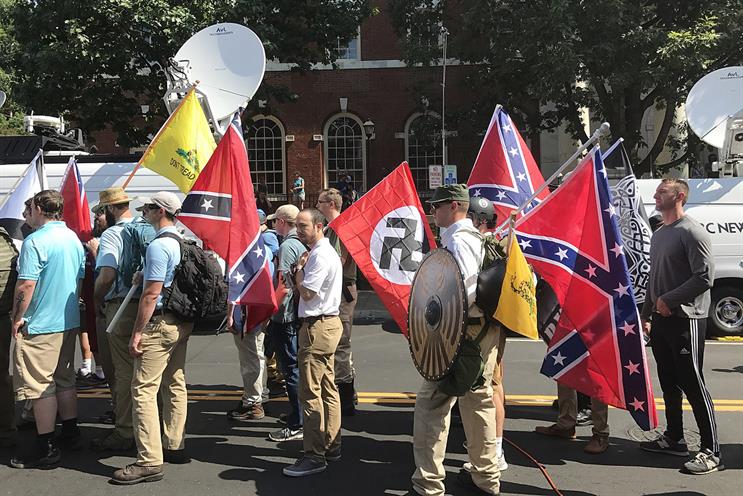How do you organise an ultra-right-wing demonstration in a sleepy Southern college town?
The Unite the Right march that took place last week in Charlottesville was organised using a Facebook page.
The day before the event took place the site was taken down. But that was too late for 32-year-old Heather Heyer, who was killed when a participant drove his car into a crowd of counter-protesters.
For those so inclined there was a Facebook page called ‘‘Right Wing Death Squad’’ and another called ‘‘White Nationalists United."
On Reddit, there was a hard-right community called ‘‘Physical Removal,’’ an organiser of which had called the weekend’s killing ‘‘a morally justified action.’’
As well as distributing President Trump’s lunacy, Twitter hosted accounts associated with 4chan’s "Politically Incorrect" message board, or /pol/.
Indeed, by some measures, 60% of all news consumed in the US is via social media such as Facebook or Google-owned YouTube. In the week leading up to the US election, some estimates claim 80% of the news about candidates was fake news.
To defend themselves against accusations of hyper-distributing hate speech and lies, the owners of these sites have wrapped themselves in the flag of liberalism.
Or as one critic has pointed out "in the process of building private communities, these companies have put on the costumes of liberal democracies."
By banging on about liberal values, Facebook and Google – which are essentially advertising and data-mining firms — have found it easier to persuade customers to entrust their private and public life to them – convincing users it’s all about it’s something more.
But that must all change now. Just as Grenfell is a turning point for local councils and austerity politics in the UK, so Charlottesville could be a turning point for social media.
It’s time to call out the statesmanlike posturing of Facebook’s Mark Zuckerberg now the company he controls has been shown to have been weaponised by the far-right.
And social platforms such as Twitter and Reddit need to properly deal with disruptive users and offensive content, instead of their current laissez-faire attitude that’s more about profits than principles of freedom on speech.
Of course, most of these platforms are only too happy to impose arbitrary boundaries against spam, profanity or in response to the demands of foreign governments if there is a dollar in it for them. But as private companies with no obligation to protect civil discourse, they will equally cry "freedom of speech" if doing so protects their bottom line.
Some have argued the fact they are leviathans controlled centrally means they are, in fact, much more attuned to acts of authoritarianism than freedom of speech. As one critic said after Charlottesville: "It makes some sense that people with authoritarian tendencies would have an intuitive understanding of how these platforms work and how to take advantage of them."
Now that the right-wing hordes have, as a Neo-Nazi put it: "stepped off the internet in a big way," it's time for Facebook and Google to do the due diligence that other media companies such as Bloomberg or The New York Times do to make sure the stories they distribute are not fake news or hate-speech or worse.
They are going to have to kick some people off their platform, squelch some content and, at last, initiate real standards, or face regulatory consequences.
Sure, with fully operational stewardship these companies may be accused of censorship but they’d also save themselves — and us — from the bottom 10% of every population that is hell-bent on the destruction of liberal values.
They can no longer offer a platform to fascists and hostile foreign powers just because moderating their colossal platforms is difficult and costly.
As society starts to change how it sees how these monoliths that have amassed colossal power, new monopolists such as Facebook and Google really have no choice but to change.
"We're nearing the moment when we will have to damage one of our revolutions to save the other," said The Atlantic writer Frank Foer.
Technology cannot be allowed to destroy democracy, can it?
Andy Pemberton is the director of Furthr


